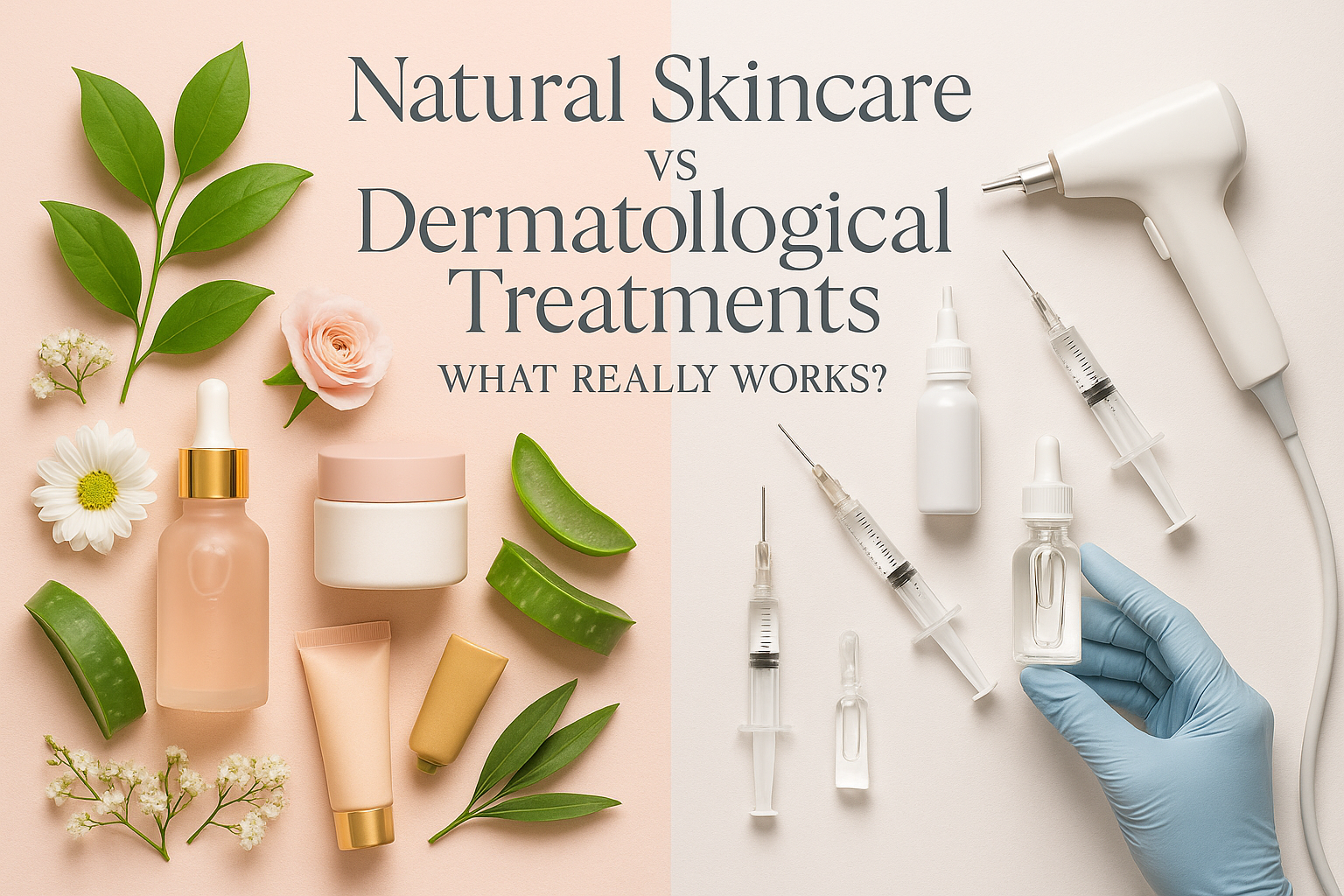Skincare isn’t one-size-fits-all. With growing interest in clean beauty and ancient healing practices, many people now find themselves choosing between natural skincare and dermatologist-approved skincare. But which one actually delivers results?
This guide breaks down the key differences between natural skincare vs chemical products, explores the role of ayurvedic skincare, and explains when professional treatments might be your best bet.
Understanding Natural Skincare
Natural skincare products are derived from plants, minerals, and other naturally occurring substances. These formulations often avoid synthetic chemicals, parabens, and artificial fragrances.
Supporters love natural skincare for its simplicity. Ingredients like aloe vera, rose water, turmeric, and shea butter are commonly used to calm, hydrate, or brighten the skin.
However, the natural route isn’t always foolproof. While gentle for many, some botanical ingredients can trigger allergic reactions. Plus, without standardization, potency and results can vary widely.
Ayurvedic Skincare: Ancient Wisdom for Modern Skin
Rooted in traditional Indian medicine, ayurvedic skincare focuses on harmony between the body and nature. It classifies individuals by their dosha (body type) and recommends specific herbs or routines accordingly.
Neem, sandalwood, and saffron are examples of ayurvedic ingredients used to balance inflammation, purify the skin, and promote glow. These treatments aim for long-term healing rather than short-term fixes.
Still, because ayurvedic products often lack clinical trials, their effectiveness can be subjective. And without a personalized approach, results may be inconsistent.
What Does Dermatologist-Approved Skincare Offer?
Unlike many natural options, dermatologist-approved skincare is often backed by clinical studies and formulated for specific skin concerns like acne, rosacea, melasma, or aging.
These products may contain active ingredients such as:
-
Retinoids for anti-aging
-
Salicylic acid for acne
-
Niacinamide for calming redness
-
Ceramides for strengthening the skin barrier
When used correctly, these formulas can transform the skin’s texture, tone, and health. However, misuse or overuse can lead to irritation — especially for beginners.
“Natural ingredients such as essential oils … can cause irritation or allergic reactions for some individuals. Conversely, some synthetic ingredients are specifically designed to be gentle and cause fewer skin reactions. Not all natural products are inherently good and not all synthetic ones are bad.”
— Dr. Rosalind Simpson, dermatologist and associate professor at the University of Nottingham.
Natural Skincare vs Chemical: Which Should You Choose?
There’s no universal answer. Your skin type, lifestyle, and goals play a major role.
Natural and ayurvedic routines work well for those looking for a gentle, holistic approach — especially if your skin is sensitive or easily irritated. But if you're tackling persistent issues like hormonal acne or premature wrinkles, dermatologist-grade treatments tend to offer faster and more predictable results.
Importantly, don’t be swayed by fear-based messaging. Just because something is “chemical” doesn’t make it harmful. Even water is a chemical — what matters is how ingredients interact with your skin.
Is It Safe to Combine Both?
Absolutely. Many people benefit from a hybrid routine.
For instance, you might use a natural rosewater toner and layer it with a dermatologist-recommended serum. Or apply a turmeric face mask on weekends while sticking to a prescription retinoid on weekdays. This way, you get the soothing benefits of nature alongside proven science.
Just introduce new products slowly and avoid mixing too many active ingredients at once to prevent skin irritation.
When Should You See a Dermatologist?
While natural remedies can support healthy skin, there are times when professional help is essential. If you notice any of the following, it’s best to book a consultation:
-
Persistent breakouts or painful cystic acne
-
Unexplained redness, flaking, or swelling
-
Skin conditions like eczema, psoriasis, or rosacea
-
Uneven pigmentation that doesn’t improve over time
A dermatologist can accurately diagnose the issue and recommend a safe, effective treatment plan tailored to your skin.
Final Thoughts
The real secret to great skin isn’t choosing between natural skincare vs chemical — it’s understanding what your skin actually needs.
Ayurvedic skincare can offer harmony and balance. Dermatologist-approved skincare brings science and precision. The best results often come from a thoughtful combination of both, built around your unique skin type and concerns.
When in doubt, consult a qualified dermatologist. Because with skincare — especially in a world full of misinformation — informed choices matter most.





